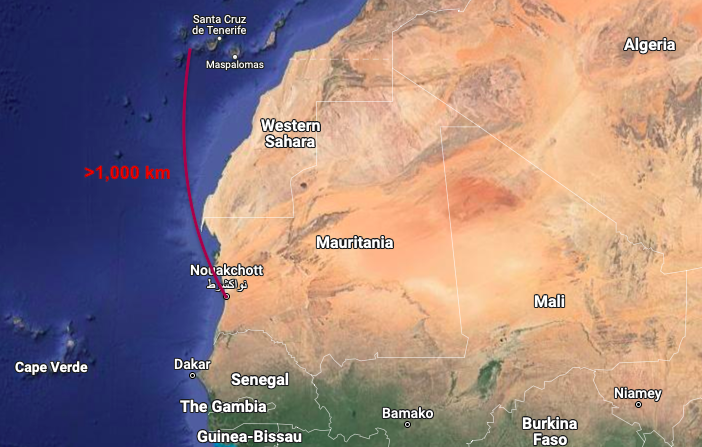Mauritanian authorities have dismantled a migrant smuggling ring in Nouakchott, involving six individuals and the seizure of fake visas and passports. Mauritania has become an increasingly important departure point for migrants attempting the perilous Atlantic crossing to Europe, as Libya and Tunisia tighten their migration controls.
Mauritanian authorities announced on Monday (June 16) that they have dismantled a network involved in migrant smuggling and visa forgery in the capital, Nouakchott.
According to a statement from Mauritanian police, the operation was conducted by the judicial investigation brigade of the Central Office for Combating Smuggling of Migrants and Trafficking in Persons. The raid took place between Sunday night and Monday morning, the statement added.
The network consisted of six individuals -- four Mauritanians and two foreign nationals -- who are said to have specialized in forging entry visas for third countries. These "fake visas" were sold to migrants for amounts ranging from 1,700 to 2,000 euros.
During the raid, authorities seized fifty passports from various African countries, along with a computer, printer, and other forgery equipment. They also confiscated entry and exit stamps from several unspecified countries.
Read AlsoMauritania – a new irregular migration gateway to Europe?
Why Mauritania?
Mauritania has become a rising transit hub on African migration routes to Europe, with thousands of migrants passing through the country in hopes of reaching Spain’s Canary Islands.
Situated about 1,160 kilometers (720 miles) off Mauritania’s coast, undocumented migrants attempt the perilous Atlantic crossing to reach the Canary Islands, a journey that can extend up to 1,000 miles. The Atlantic route is now considered one of the deadliest in the world, claiming many migrant lives each year.
In 2024, Mauritania emerged as the leading departure point for migrants heading to Spain, with more than 25,000 people embarking on the journey -- exceeding the combined totals from Morocco and Algeria.
According to Spain’s National Security Department (DSN), over 61,000 migrants reached Spanish territory by sea, driving maritime arrivals to a record high. The majority of the migrants arrived in the Canary Islands.
Official figures for 2024 show that 25,081 migrants departed from Mauritania, compared to 13,217 from Morocco and 12,038 from Algeria. Senegal also accounted for a significant number of departures (8,970), while 250 left from Guinea-Bissau.
The DSN has said that ongoing instability in the Sahel region could drive further migration to Spain.

Mauritania – an alternative route
The sharp rise in departures from Mauritania is largely attributed to increased border controls in North Africa such as in Tunisia and Libya, which have redirected migration flows toward the Atlantic route.
In the past year, Europe has strengthened migration deals and collaborated with Libya and Tunisia to curb irregular migration, such as the EU’s agreement to provide financial aid and border security support in exchange for cooperation on migration management and accepting migrant returns, despite human rights concerns. These agreements are part of the EU's broader strategy to externalize its borders, shifting migration management to third countries.
What's driving migrants to the Canary Islands?
Migrants are drawn to the Canary Islands as a gateway to Europe, motivated by hopes of finding better economic opportunities and security. Factors such as poverty, unemployment, political unrest, and climate change such as in the turbulent Sahel region continue to drive people from their home countries.
As Europe and North Africa crack down on traditional migration routes and implement restrictions, the Atlantic crossing has become a more viable, albeit dangerous, alternative.
Smuggling networks are jumping on the latest migration trend by facilitating such journeys or parts of them.
With EFE
